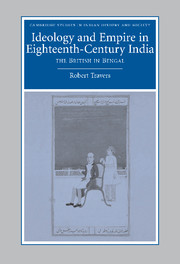Book contents
- Frontmatter
- Contents
- Preface and acknowledgements
- Abbreviations and note on currency
- Glossary of Indian terms
- Map of Bengal and Bihar in the Eighteenth-Century
- Introduction
- 1 Imperium in imperio: the East India Company, the British empire and the revolutions in Bengal, 1757–1772
- 2 Colonial encounters and the crisis in Bengal, 1765–1772
- 3 Warren Hastings and ‘the legal forms of Mogul government’, 1772–1774
- 4 Philip Francis and the ‘country government’
- 5 Sovereignty, custom and natural law: the Calcutta Supreme Court, 1774–1781
- 6 Reconstituting empire, c. 1780–1793
- 7 Epilogue
- Bibliography
- Index
- Cambridge Studies in Indian History and Society
6 - Reconstituting empire, c. 1780–1793
Published online by Cambridge University Press: 18 July 2009
- Frontmatter
- Contents
- Preface and acknowledgements
- Abbreviations and note on currency
- Glossary of Indian terms
- Map of Bengal and Bihar in the Eighteenth-Century
- Introduction
- 1 Imperium in imperio: the East India Company, the British empire and the revolutions in Bengal, 1757–1772
- 2 Colonial encounters and the crisis in Bengal, 1765–1772
- 3 Warren Hastings and ‘the legal forms of Mogul government’, 1772–1774
- 4 Philip Francis and the ‘country government’
- 5 Sovereignty, custom and natural law: the Calcutta Supreme Court, 1774–1781
- 6 Reconstituting empire, c. 1780–1793
- 7 Epilogue
- Bibliography
- Index
- Cambridge Studies in Indian History and Society
Summary
Impey's regulations for the civil courts were a sign of the future. While parliamentary speeches extolled the beneficence of British rule in preserving the laws of India from alien invasion, the official language of the Company government of Bengal was gradually moving away from the idea of the ancient Mughal constitution. Debates over the Supreme Court appeared to reveal the fragility of ‘custom and usage’ and the irregular nature of a territorial administration buffeted by war, conquest and famine. Meanwhile, the gradual extension of parliamentary oversight offered a new source of legality independent of the Mughal constitution.
This chapter outlines how the idea of colonial state-building as constitutional restoration slowly dissolved in the new political climate of the 1780s and 1790s. Crucially, the empire of the Company was now more fully absorbed into the British imperial state. From the mid-1780s a more unified brand of British imperialism moved away from divisive disputes about the Mughal past, and announced itself more confidently as a decisive break from the history of Asiatic tyranny. As the East India Company service rebranded itself as a purified agency of imperial virtue, the entrenched critique of Asiatic manners finally overwhelmed the more fragile sense of Mughal imperium as a viable form of sovereignty.
In the 1770s, Warren Hastings and Philip Francis, armed with competing visions of the Mughal constitution, had fought to a stalemate. Hastings' absolutist interpretation of Mughal sovereignty, tempered by ancient legal traditions, provoked Francis' assertion of an ancient constitution of property.
- Type
- Chapter
- Information
- Ideology and Empire in Eighteenth-Century IndiaThe British in Bengal, pp. 207 - 249Publisher: Cambridge University PressPrint publication year: 2007

